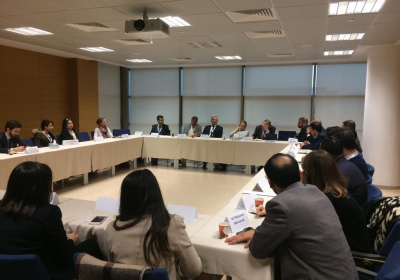On Wednesday, February 20, the AUIS Entrepreneurship Initiative hosted Rava Khorshid, Business Development Manager at the Professional Development Institute at AUIS and candidate at the Masters of Business Administration program at Lahti University of Applied Sciences in Finland, for a workshop discussing the research findings of her masters’ thesis. Over the past year, Rava had been conducting research on innovation in startups in the Kurdistan Region or Iraq (KRI) in an effort to support and inform AEI priorities for entrepreneurs at AUIS and in the local community.
The workshop convened local entrepreneurs, relevant AUIS staff and faculty, and members of the Sulaimani Chamber of Commerce to discuss main points, key findings, and practical implications for AEI goals and curriculum development. Her research relied on a variety of secondary source material and interviews with local entrepreneurs to determine and evaluate major enablers and inhibitors to innovation in regional startups.
After a brief review of the goals of her project and guiding question of her research, “How can startups in the KRI enhance their innovation practices and contribute to private sector growth?”, she explained the unique ways in which the entrepreneurs she interviewed interpreted and implemented the concept of innovation. She noted that despite the fact that many entrepreneurs viewed innovation as a new, creative way of thinking or a change in mindset, few innovated through deliberate plans and processes or reinvented well-established and successful business processes. While many sought to fill existing gaps in the local market, they did not aim to create new or groundbreaking technologies on a global scale.
Rava found that many of the barriers to innovation in the KRI revolved around the lack of local networking opportunities, limited customer responsiveness to innovation, scarce financial resources, weak transportation and delivery infrastructure, and outdated intellectual property laws. However, despite these barriers, many entrepreneurs found that the myriad gaps in the market allowed for innovation and entrepreneurial ventures.
In concluding the overview of her existing research, she posed five questions aimed at crowdsourcing ideas to strengthen AEI programming and curriculum development:
1. As a facilitator, AEI could have a significant role in developing the entrepreneurship ecosystem in the region. What educational initiative should AEI run to remove the identified barriers, and what kind of actors should cooperate with AEI to make these initiatives possible?
Participants advocated for greater opportunities for networking events, startup fairs, and connections to mentoring or consulting services. In particular, they suggested establishing an “Innovation Hub” in cooperation with the Sulaimani Chamber of Commerce (SCC) to provide a coworking space for startups to gather and work together.
The conversation also acknowledged that the current legal, regulatory, and financial services environment would be unlikely to change in the next five years, so entrepreneurs and educational institutions had to promote skills to help entrepreneurs flourish despite structural obstacles, or opportunities to slowly grow a body of resources. In reference to the latter, the entrepreneurs and government officials stressed the need for market data, as well as information on the numbers and types of businesses present in Sulaimani or the KRI. While a senior official at the SCC noted that the Chamber is required by law to collect data on businesses registering and operating in the city, he acknowledged that the law had not been implemented. Participants also noted that the data acquisition process for existing information held by the SCC was extremely time consuming and costly. While in many other countries, data was free and publicly available, requests for access to data in Sulaimani could cost up to 100,000 IQD. They suggested that AEI could play a role in facilitating access to data or coaching entrepreneurs to collect and publish data on their own businesses in a standardized manner.
2. How could AEI support the university to improve the balance of preparing students to be both jobseekers and entrepreneurs?
Participants reiterated the need for entrepreneurs and educators to connect and learn from each other, particularly through the following:
-
Networking sessions
-
Mentorship opportunities
-
Data collection on market trends and businesses
-
Formalizing, standardizing, and/or digitizing existing data and making it free and easily accessible
Again emphasizing the need for clear and usable data, participants recommended working with ThinkBank, a recently-established Sulaimani-based market research company that conducts feasibility studies and provides concept testing, advertisement and campaign evaluation, and consumer tracking.
Given AEI’s location at AUIS and potential benefits for AUIS students, it is also important to ensure that a wide range of students--beyond the business department--have the opportunity to take coursework on innovation and entrepreneurship. Participants agreed that the development of an entrepreneurship curriculum should involve new courses on creativity and innovation and benefit students in business, IT, engineering, and other disciplines to ensure maximum collaboration and opportunities for graduates to start their own businesses.
3. What research could AEI undertake in the future to understand and address the local entrepreneurship and innovation challenges?
The question sparked a discussion among entrepreneurs about the most pressing needs of startups in the KRI, including:
-
Cultivation of an innovation mindset
-
Government support for entrepreneurs and startups
-
Knowledge of and solutions to the root causes of startup failure in Iraq
-
Development of models tailored specifically to the needs of regional consumers
-
Greater knowledge of consumer behavior in Iraq and the KRI
-
Widespread understanding of and efforts to increase proliferation of online payment systems
4. What kind of knowledge transfer initiatives and programs shall AEI perform with different actors in the ecosystem?
Again, participants focused largely on information gathering, collaboration with the public sector, and understanding of consumer needs. In particular, the following suggestions were made:
-
Encouraging entrepreneurs to collect, standardize, publicize, and digitize more data about their businesses and customer base, and promoting greater public collection and disbursement of data
-
Supporting the development and disbursement of customer surveys and interviews
-
Working with government institutions such as the SCC to publicize success stories
5. What can AEI do to attract funding for startups and ecosystem building in general?
-
Provide education on proper investment practices, including legitimate amounts of ownership to take in young companies
-
Provide trainings for entrepreneurs and investors on how to develop exit strategies
-
Promote and inform long-term investment options from major institutions




